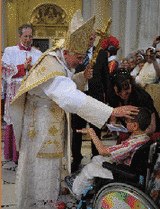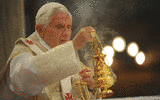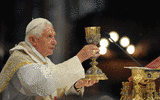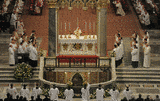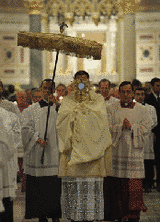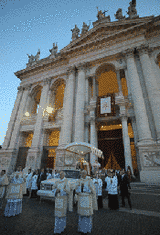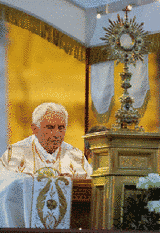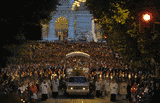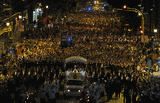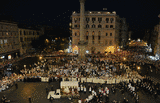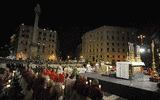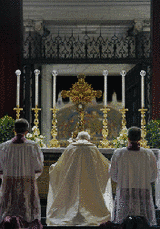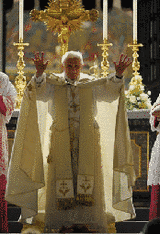Solemnity of Corpus Christi 2011
Pope Benedict XVI's Homily at Mass
Piazza outside the Basilica of St John Lateran
before Adoration of the Blessed Sacrament & a Eucharistic Procession to the Basilica of St Mary Major
Thursday, 23 June 2011 - in English, French, German, Italian, Portuguese & Spanish
"Dear Brothers and Sisters!
The Feast of Corpus Christi is inseparable from Holy Thursday, from the Mass in Caena Domini, in which the Institution of the Eucharist is solemnly celebrated. Whereas on the evening of Holy Thursday we relive the mystery of Christ who offers himself to us in the bread broken and the wine poured out, today, in the recurrence of Corpus Christi, this same mystery is proposed for the adoration and meditation of the People of God, and the Blessed Sacrament is carried in procession through the streets of the cities and villages, to show that the Risen Christ walks in our midst and guides us towards the Kingdom of Heaven. What Jesus gave to us in the intimacy of the Upper Room today we express openly, because the love of Christ is not reserved for a few but is destined for all. In the Mass in Caena Domini last Holy Thursday, I stressed that it is in the Eucharist that the transformation of the gifts of this earth takes place — the bread and wine — whose aim is to transform our life and thereby to inaugurate the transformation of the world. This evening I would like to focus on this perspective.
Everything begins, one might say, from the heart of Christ who, at the Last Supper, on the eve of his passion, thanked and praised God and by so doing, with the power of his love, transformed the meaning of death which he was on his way to encounter. The fact that the Sacrament of the altar acquired the name “Eucharist” — “thanksgiving” — expresses precisely this: that the changing of the substance of the bread and wine into the Body and Blood of Christ is the fruit of the gift that Christ made of himself, gift of a Love stronger than death, divine Love which raised him from the dead. This is why the Eucharist is the food of eternal life, the Bread of Life. From Christ’s heart, from his “Eucharistic prayer” on the eve of his passion flows that dynamism which transforms reality in its cosmic, human and historical dimensions. All things proceed from God, from the omnipotence of his Triune Love, incarnate in Jesus. Christ’s heart is steeped in this Love; therefore He can thank and praise God even in the face of betrayal and violence, and in this way He changes things, people and the world.
This transformation is possible thanks to a communion stronger than division, the communion of God himself. The word “communion”, which we also use to designate the Eucharist, in itself sums up the vertical and horizontal dimensions of Christ’s gift. The words “to receive communion”, referring to the act of eating the Bread of the Eucharist, are beautiful and very eloquent. In fact, when we do this act we enter into communion with the very life of Jesus, into the dynamism of this life which is given to us and for us. From God, through Jesus, to us: a unique communion is transmitted through the Blessed Eucharist. We have just heard in the Second Reading the words of the Apostle Paul to the Christians of Corinth: “The cup of blessing which we bless, is it not a participation in the blood of Christ? The bread which we break, is it not a participation in the body of Christ? Because there is one bread, we who are many are one body, for we all partake of the one bread” (1 Cor 10:16-17).
St Augustine helps us to understand the dynamic of Eucharistic communion when he mentions a sort of vision that he had, in which Jesus said to him: “I am the food of strong men; grow and you shall feed on me; nor shall you change me, like the food of your flesh into yourself, but you shall be changed into my likeness” (Confessions, vii, 10, 18). Therefore whereas food for the body is assimilated by our organism and contributes to nourishing it, in the case of the Eucharist it is a different Bread: it is not we who assimilate it but it assimilates us in itself, so that we become conformed to Jesus Christ, a member of his Body, one single thing with Him. This passage is crucial. In fact, precisely because it is Christ who, in Eucharistic communion changes us into Him, our individuality, in this encounter, is opened, liberated from its egocentrism and inserted into the Person of Jesus who in his turn is immersed in Trinitarian communion. The Eucharist, therefore, while it unites us to Christ also opens us to others, makes us members of one another: we are no longer divided but one in Him. Eucharistic communion not only unites me to the person next to me and with whom I may not even be on good terms, but also to brothers far away, in every part of the world. Hence the profound sense of the Church’s social presence derives from the Eucharist, as is testified by the great social saints, who were always great Eucharistic souls. The one who recognizes Jesus in the sacred Host, recognizes him in the brother who suffers, who is hungry and thirsty, who is a stranger, naked, sick or in prison; and is attentive to each person, is committed, in a concrete way, to all those who are in need. From the gift of Christ's love comes therefore our special responsibility as Christians in the construction of a solid, just and fraternal society. Especially in our time, in which globalization makes us more and more dependent on each other, Christianity can and must ensure that this unity is not built without God, that is, without true Love, which would give way to confusion, individualism and the tyranny of each one seeking to oppress the others. The Gospel has always aimed at the unity of the human family, a unity that is neither imposed from the outside nor by ideological or economic interests but on the contrary is based on the sense of reciprocal responsibility, so that we may recognize each other as members of one and the same Body, the Body of Christ, because from the Sacrament of the Altar we have learned and are constantly learning that sharing, love, is the way to true justice.
Let us now return to Jesus’ action at the Last Supper. What happened at that moment? When He said: “This is my body which is given for you, this is the cup of my blood which is poured out for many", what happened? In this gesture Jesus was anticipating the event of Calvary. Out of love He accepted the whole passion, with its anguish and its violence, even to death on the cross. In accepting it in this manner He changed it into an act of giving. This is the transformation which the world needs most, to redeem it from within, to open it to the dimensions of the Kingdom of Heaven. But God wishes always to bring about this renewal of the world through the same way followed by Christ, that way which, indeed, is He himself. There is nothing magic in Christianity. There are no short-cuts, but everything passes through the humble and patient logic of the grain of wheat that broke open to give life, the logic of faith that moves mountains with the gentle power of God. For this God wishes to continue to renew humanity, history and the cosmos through this chain of transformations, of which the Eucharist is the sacrament. Through the consecrated bread and wine, in which his Body and his Blood are really present, Christ transforms us, conforming us to Him: He involves us in his work of redemption, making us capable, through the grace of the Holy Spirit, of living in accordance with his own logic of self-giving, as grains of wheat united to Him and in Him. Thus in the furrows of history are sown and continue to mature unity and peace, which are the end for which we strive, in accordance with God’s plan.
Let us walk with no illusions, with no utopian ideologies, on the highways of the world bearing within us the Body of the Lord, like the Virgin Mary in the mystery of the Visitation. With the humility of knowing that we are simple grains of wheat, let us preserve the firm certainty that the love of God, incarnate in Christ, is stronger than evil, violence and death. We know that God prepares for all men new heavens and a new earth, in which peace and justice reign — and in faith we perceive the new world, which is our true homeland. This evening too, let us start out: while the sun is setting on our beloved city of Rome: Jesus in the Eucharist is with us, the Risen One who said: “I am with you always, until the end of the world” (Mt 28:20). Thank you, Lord Jesus! Thank you for your faithfulness which sustains our hope. Stay with us, because it is evening. “Good Shepherd, true Bread, O Jesus, have mercy on us, feed us, defend us, bring us to eternal happiness, in the land of the living." Amen."
Papa Benedetto's words at the Angelus in St Peter's Square:
Sunday, 26 June 2011 - in Croatian, English, French, German, Italian, Portuguese & Spanish
"Dear Brothers and Sisters, Today, in Italy and other countries, Corpus Christi is celebrated, the Feast of the Eucharist, the Sacrament of the Body and Blood of the Lord, which He instituted at the Last Supper and which constitutes the most precious treasure of the Church. The Eucharist is like the pulsating heart which gives life to the whole mystical body of the Church: a social organism wholly based on the spiritual yet concrete bond with Christ. As the Apostle Paul affirmed: “Because there is one bread, we who are many are one body, for we all partake of the one bread” (1 Cor 10:17). Without the Eucharist the Church simply would not exist. Indeed, it is the Eucharist which makes of a human community a mystery of communion, capable of bringing God to the world and the world to God. The Holy Spirit, who transforms the bread and wine into the Body and Blood of Christ, also transforms all those who receives it with faith into members of the body of Christ, so that the Church is really the sacrament of unity of men with God and among themselves.
In an ever more individualistic culture, such as the one in which we are immersed in western society, and which is tending to spread throughout the world, the Eucharist constitutes a sort of “antidote”, that works in the minds and hearts of believers and continually sows in them the logic of communion, of service, of sharing, in short, the logic of the Gospel. The first Christians in Jerusalem were an evident sign of this new style of life, because they lived in fraternity and shared their possessions, so that no one was in need (cf Acts 2:42-47). From what does all this derive? From the Eucharist, that is from the Risen Christ, really present in the midst of his disciples and acting with the force of the Holy Spirit. And also in the following generations, through the centuries, the Church, despite limits and human errors, has continued to be in the world a force of communion. Think especially of the most difficult periods, of trials: for example, of what the possibility of gathering together at Sunday Mass meant to countries subjected to totalitarian regimes! As the ancient martyrs of Abitene said: “Sine Dominico non possumus” — without “Dominicum” [Sunday], that is, without the Sunday Eucharist we cannot live. But the void produced by false freedom can be equally dangerous, and then communion with the Body of Christ is medicine for the intelligence and the will, to find again the taste of the truth and the common good.
Dear friends, let us invoke the Virgin Mary, whom my Predecessor Bl John Paul II defined “Woman of the Eucharist” (Ecclesia de Eucharistia, 53-58). At her school, may our life too become fully “eucharistic”, open to God and to others, capable of transforming evil into good with the force of love, reaching out to promote unity, communion, fraternity."
After the Angelus
"Cari fratelli e sorelle, anche oggi ho la gioia di annunciare la proclamazione di alcuni nuovi Beati. Ieri, a Lubecca, sono stati beatificati Johannes Prassek, Eduard Müller ed Hermann Lange, uccisi dai nazisti nel 1943 ad Amburgo. Oggi, a Milano, è la volta di Don Serafino Morazzone, parroco esemplare nel Lecchese tra XVIII e XIX secolo; di Padre Clemente Vismara, eroico missionario del PIME in Birmania; e di Enrichetta Alfieri, Suora della Carità, detta “angelo” del carcere milanese di San Vittore. Lodiamo il Signore per questi luminosi testimoni del Vangelo!
In questa domenica che precede la solennità dei Santi Pietro e Paolo si celebra in Italia la Giornata per la carità del Papa. Desidero ringraziare vivamente tutti coloro che, con la preghiera e con le offerte, danno il loro appoggio al mio ministero apostolico e di carità. Grazie! Il Signore vi ricompensi!
Je salue les pèlerins francophones, particulièrement les anciens élèves de l’Institut Saint-Dominique de Rome. En ce jour, de nombreux pays célèbrent la Solennité du Saint-Sacrement du Corps et du Sang du Christ. Nous avons toujours à redécouvrir le don inouï de son Fils que Dieu nous fait dans l’Eucharistie en participant chaque dimanche à la messe. Faisons une large place à l’adoration eucharistique ! « Le Seigneur est là, dans le sacrement de son amour, il nous attend jour et nuit », répétait le saint Curé d’Ars. Puisons à cette source d’amour et de pardon la force de conformer toujours plus notre vie à l’Evangile ! Tant de chrétiens aujourd’hui lui rendent témoignage jusqu’au don de leur vie. Que notre prière fraternelle les soutienne sans relâche !
I am happy to welcome all the English-speaking pilgrims and visitors, particularly the group from Saint Fidelis Parish in Toronto. In many places today the Church celebrates the Solemnity of the Body and Blood of Christ. May our hearts rejoice in the great gift of Jesus, the Bread of Life, who has given himself for us and has come to nourish us. As we open our hearts to others and walk the path of life, may he always sustain and guide us. God bless you all!
Von Herzen heiße ich alle deutschsprachigen Pilger und Besucher auf dem Petersplatz willkommen. Zugleich geht mein Gruß an die Gläubigen des Erzbistums Hamburg, die gestern die Seligsprechung der „Lübecker Märtyrer“ gefeiert haben. Die katholischen Kapläne Johannes Prassek, Hermann Lange und Eduard Müller sowie der evangelische Pastor Karl Friedrich Stellbrink haben mit ihrem gemeinsam getragenen Leiden im Gefängnis bis zu ihrer Hinrichtung im Jahre 1943 ein großartiges, auch ökumenisches Zeugnis der Menschlichkeit und der Hoffnung gegeben. Es ist beeindruckend, wie sie in ihren Kerkerzellen stets den Blick zum Himmel gerichtet haben. So hat Johannes Prassek geschrieben: „Wie ist Gott so gut, daß er mir alle Furcht nimmt und die Freude und die Sehnsucht schenkt“. Lassen wir uns von ihrem Gottvertrauen anstecken und bringen wir das Evangelium der Liebe zu den Menschen unserer Zeit. Der Herr begleite unser Reden und unser Tun.
Saludo cordialmente a los peregrinos de lengua española que participan en esta oración mariana, en particular a los miembros de la Asociación de la Medalla Milagrosa, así como a los directivos de la Radiotelevisión “El sembrador por la nueva evangelización”. En la solemnidad del Santísimo Cuerpo y Sangre de Cristo, la Iglesia hace memoria agradecida del don de la Eucaristía y la adora con devoción. Que nuestros corazones se abran con humildad ante Jesús Sacramentado, para que, transformados por su gracia, seamos testigos valientes de su amor por todos los hombres. Que Dios os bendiga.
Słowo pozdrowienia kieruję do wszystkich Polaków, a szczególnie do Episkopatu Polski i wiernych, uczestników jubileuszu 600-lecia konsekracji katedry włocławskiej. W modlitwie polecam was Najświętszej Maryi Pannie Wniebowziętej, Patronce katedry. Niech wymowne dzieje tej świątyni będą dla wszystkich zachętą do trwania w wierze Ojców i świadczenia o Chrystusie w codziennym życiu. Z serca wam błogosławię.
Infine, saluto con affetto i pellegrini italiani, in particolare il gruppo dell’associazione “Laici Betlemiti”. A tutti voi auguro una buona domenica, una buona settimana. Buona Festa dei Santi Pietro e Paolo. Buona domenica a tutti voi!"
